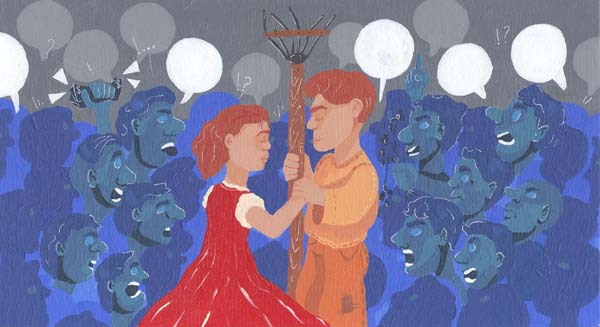Teresa, con amor Part 2: Merida
Illustrated by Arianne Larose
 Merida in 1937 was booming, practically holding the Mexican economy in its palms: the Oro Verde1 was the only gold anyone was interested in, and even President Cardenas came to visit the city at least once a month. Paseo Montejo burst with the most expensive restaurants and its paved sidewalks were lined with millions of multicolored flowers. Light-skinned women with exotic accents walked around with beautiful big white hats; men wearing thick guayaberas would sit in cafes, admiring them while smoking profusely and listening to the latest of Agustín Lara,. At night, the richest families would go to a beautiful, French-styled ballroom in any of their houses to drink and dance all night. People would keep on dancing until the sun came up; then the hosts would offer breakfast and the guests would eat and go home, to rest until the day was cool enough to go out again.
Merida in 1937 was booming, practically holding the Mexican economy in its palms: the Oro Verde1 was the only gold anyone was interested in, and even President Cardenas came to visit the city at least once a month. Paseo Montejo burst with the most expensive restaurants and its paved sidewalks were lined with millions of multicolored flowers. Light-skinned women with exotic accents walked around with beautiful big white hats; men wearing thick guayaberas would sit in cafes, admiring them while smoking profusely and listening to the latest of Agustín Lara,. At night, the richest families would go to a beautiful, French-styled ballroom in any of their houses to drink and dance all night. People would keep on dancing until the sun came up; then the hosts would offer breakfast and the guests would eat and go home, to rest until the day was cool enough to go out again.
I did not participate in those festivities until I was fifteen, and even then, mother would send me home by 11 pm. She would always tell me that past 11 was when “hands got sticky and men got pricky.” I knew it to be true from the parade of stepfathers I had to go through after my father got killed. When I turned sixteen, I had my first glass of champagne. It wasn’t half as exciting as I thought it would be. It was also the year I was presented to society, and the year we lost everything.
It was in one of those fancy parties where I first met Pepito. He was fresh out of med school and made all his friends call him doctor. He was the talk of the town, the perfect bachelor. When I first saw him, I didn’t feel he was half as handsome as everyone said. Our parents knew each other; therefore, he came to say hello. We talked about the weather (unusually fresh summer) and about the size of the party. After a few minutes of silence, he excused himself and went back to his friends, who were surrounding the dance floor, hunting for any lady desperate enough to dance with one of them. They looked ridiculous, wearing their pajaritas as if those were a badge of honour and sticking their chest out like pigeons, the ones we see everyday in the sócalo of Merida. I wouldn’t have been surprised if they suddenly raised their arms and burst out into some kind of mating dance.
After dancing three times––once with Sr. Zaragoza, who had clammy hands, and twice with Ignacio Gonzalez, who had become widowed no long ago and had recently acquired very long, very slippery hands that he found any excuse to use, from rearranging a twisted stocking to “plucking out” little fluff stuck in the neckline of a woman’s dress––I asked my mother if I could leave early, and she said yes but to ask the driver to come back immediately, so she could have a ride.
“Claro madre,” I said, failing to mention that the driver wouldn’t be taking me anywhere. I left the house by the kitchen’s exit, took off my shoes and walked home barefoot, enjoying the freshness of the night and the quiet streets while missing those incredibly comfortable charoles I used to wear when I was younger.
The next morning I went down to the patio, sat down in one of the garden chairs and watched Pedrito wash the tile floors with a scrub brush, water and vinegar. I pretended to read a book while I observed Pedro’s very focused expression, the muscle lines tensing and untensing as he moved forward and back, scrubbing. When he finished, he came closer and I told him everything that had happened at the party last night.
“Same old, same old. Don Zaragoza’s hands were even sweatier than usual though, if that’s possible.”
He laughed and his walnut eyes wrinkled, which made me imagine what he’d look like when he got older. I didn’t pay much attention to what he was saying, my focus more on fantasizing how our kids would be like.
“Teresita?” he said, expectantly.
“Sí, perdona. So Pepito came to the party yesterday, and he came in to say hi. I’m pretty sure our parents put him up to it. Mother kept saying how cute our baby would be, with my blue eyes and his blond hair. I hope that idea does not stick in between her hair-do, though, cause she would be in for a big disappointment.”
Pedro got up and mumbled that he had to go help in the kitchen and left, looking a bit shaken out and bothered. I saw him leave and I couldn’t help but smile: he looked so cute when he got jealous.

Comments
No comments posted yet.
You have to be registered and logged in in order to post comments!